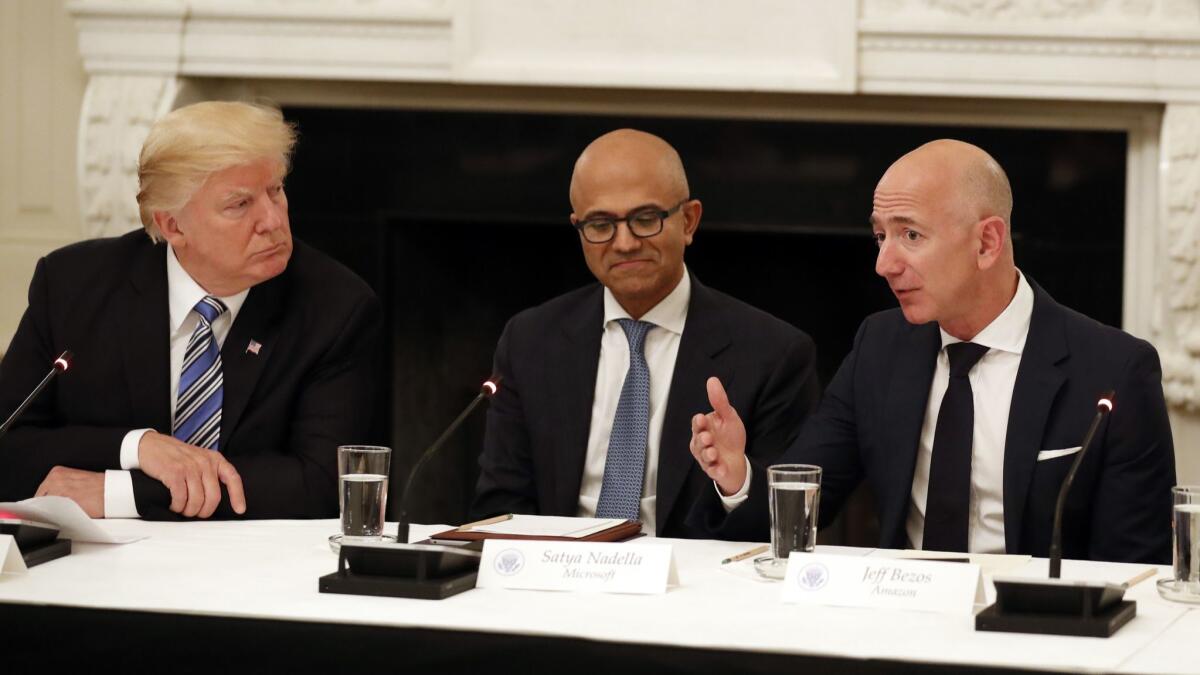Judge rules for Pentagon and Amazon, and against Oracle, in cloud bidding case

- Share via
A federal judge has dismissed allegations that bidding for a $10-billion cloud computing contract with the U.S. military was rigged to favor Amazon.com Inc.
Friday’s ruling dismissing Oracle Corp.’s claims clears the Defense Department to award the contract to one of two finalists: Amazon or Microsoft Corp.
It will be a boon for whichever company gets to run the 10-year computing project, which the U.S. military considers vital to maintaining its technological advantage over adversaries and accelerating its use of artificial intelligence in warfare.
Oracle and IBM were eliminated during an earlier round, but Oracle persisted with a legal challenge claiming conflicts of interest.
Court of Federal Claims Judge Eric Bruggink said Friday that Oracle can’t demonstrate favoritism because it didn’t meet the project’s bidding requirements to begin with. Bruggink also sided with a Pentagon contracting officer’s earlier finding that there were no “organizational conflicts of interest” and no individual conflicts that harmed the bidding.
Defense Department spokeswoman Elissa Smith praised the judge’s order, saying it reaffirms the Pentagon’s position that the bidding process “has been conducted as a fair, full and open competition, which the contracting officer and her team executed in compliance with the law.”
Smith said the military “has an urgent need” to get the cloud services in place. The Pentagon plans to pick a vendor as soon as Aug. 23.
Formally called the Joint Enterprise Defense Infrastructure plan, or JEDI, the military’s computing project would store and process vast amounts of classified data, allowing the Pentagon to use artificial intelligence to speed up its war planning and fighting capabilities. The initial contract starts at $1 million but calls for as much as $10 billion in spending over the course of the partnership.
Amazon was considered an early favorite when the Pentagon began detailing its cloud needs in 2017, but rivals accused Amazon executives and the Pentagon of being overly cozy.
Oracle had its last chance to make its case against Amazon — and the integrity of the government’s bidding process — in oral arguments Wednesday. The judge ruled two days later.
Oracle spokeswoman Deborah Hellinger didn’t address the ruling in a statement Friday but said the company looks forward to working with the Defense Department and other agencies in the future.
Some members of Congress have expressed concerns about reports of potential favoritism toward Amazon. In an emailed statement this week, Sen. Chuck Grassley (R-Iowa) said the Pentagon should start the bidding process over and rewrite its proposal.
“The Defense Department should, at the very least, hold off on awarding the contract until the inspector general has had a chance to conduct a thorough investigation and report on their findings,” Grassley said.
Criticism of the project has also centered on the Pentagon’s decision to award the entire 10-year contract to one vendor, tasking a single private company with storing and securing so much secret data.
Murli Thirumale, chief executive of cloud computing startup Portworx, said a decade is a “lifetime” in technology, and relying on one vendor for that long could limit innovation.
“To make a 10-year bet is way too problematic,” said Thirumale, who said his company is a sales partner with IBM Corp., Amazon and Microsoft but doesn’t have direct financial interests in the deal. “You may not have access to the best and brightest technologies.”
Amazon said in a statement that it “stands ready to support and serve” the Defense Department’s mission. It has characterized Oracle’s objections as meritless and its conflict allegations as “tabloid sensationalism.”
In a court filing last month, Air Force Lt. Gen. Bradford Shwedo, a chief information officer for the Joint Chiefs of Staff, said further delays in the Oracle case would “hamper our critical efforts in AI” as the United States tries to maintain its advantage over adversaries who are “weaponizing their use of data.” Shwedo said JEDI’s computing capabilities could help the United States analyze data collected from surveillance aircraft, predict when equipment needs maintenance and speed up communications if fiber and satellite connections go down.
More to Read
Inside the business of entertainment
The Wide Shot brings you news, analysis and insights on everything from streaming wars to production — and what it all means for the future.
You may occasionally receive promotional content from the Los Angeles Times.










